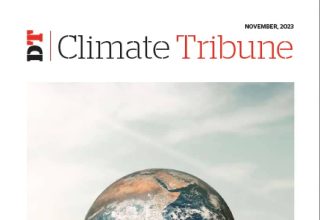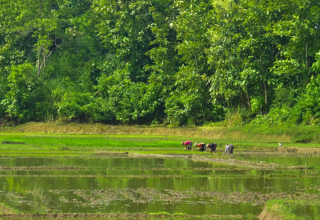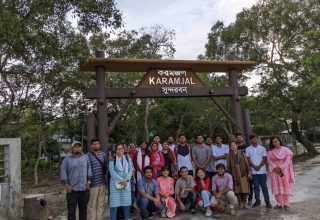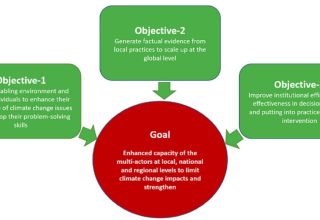
The following article is an account of the life of Md Rafiqul Islam from Bazar Road, Morrelganj Upazila in Bagerhat district. Rafiqul is a sanitation entrepreneur, trader, and businessman in Morrelganj.
With an extended family including his parents, two sisters, wife, and two children. His family belongs in the lower-income class. However, he was able to complete his Bachelors’ degree, with personal dedication, effort and extra income that he saved from his school days. Being an elder son and the only educated member in his family, they had high expectations from him.
With the hope to support his family and determination to make something of himself, Rafiqul started working with an insurance company after his graduation in Jessore district of Bangladesh with a very low salary.
Rafiqul recalls — “At the same time, very unplanned though, I got married. My marriage added extra responsibilities and expenses as well. Time went by, my father grew older; had various health problems and became unable to work. Then I was the only earning member in my entire family and I was struggling to meet the basic needs. Over time, I became the father of a daughter and was thinking about how to increase my income. Then suddenly my company handed me my termination letter with one month’s notice as it decided to lay off staff due to cost minimization. I was so shocked, helpless, and frustrated at that situation.”
Rafiqul had to leave Jessore and return to his village. Recalling his crisis, Rafiqul said, “I tried to find another job with all my heart but I could not manage it. I could hardly run my family for 2-3 months with the savings I had. I was trying to find something, and I was almost lost. At this stage (January 2018), one of my friends informed me that the Department of Public Health Engineering (DPHE) is organizing ‘Sanitation Entrepreneurship Training’ in Morrelganj and advised me to participate.”
Rafiqul further stated that he was completely unaware of ‘Sanitation Entrepreneurship’. “I did not have any idea about how it works but I was in a state where I needed to hold onto anything I could to survive. So, I did not think twice. I decided to apply for the training as it was free of cost.”
Rafiq also mentioned that others taking the training were also on the same boat with minimum knowledge and awareness of sanitation. “We did not appreciate the basic need for safe sanitation facilities. Being in the coastal region, I am a witness to existing low-quality sanitation facilities washed away by rapid and intensive natural calamities such as cyclones, flooding, and tidal surge from time to time. It is very common that after any disaster the primary damage happens to sanitation arrangements. In remote and hard-to-reach areas, sanitation equipment are not available locally, which makes them even more costly.”
Nizam Uddin, who is Rafiq’s local friend, played a big role in sensitizing Rafiq. “We suffer a lot for not having a proper sanitation facility. Most of the people in our village live under the poverty line. Even meeting essential needs of food and medication is difficult, so thinking of safe and well-equipped sanitation facilities proves to be out of the question. No one cares about the sanitation system. Moreover, we do not have access to sanitation commodities to buy or to get support from the Government or other institutions. Sanitation facilities are a kind of luxurious item for us,” said Rafiqul.
With the eagerness to learn and understand the scope of building a potential market for sanitation, Rafiqul looked forward to his training. The training started in February 2018 and continued for three days. In the training,Rafiqul learned theoretical and practical knowledge on sanitation materials including ring-slabs for latrines, pillars, and poles with standard measurement, practice, and technique.
During the training, the trainer Tariqul Islam, who was the District Assistant Engineer, motivated the trainees by encouraging them how it can be a good opportunity for the young entrepreneurs in Morrelganj. The learning can open new areas of thinking especially in the sanitation sector. With the trainees being the first batch to get such an opportunity, there was the potential for them to be the pioneers of this entrepreneurship.
In the theory part, they had learned about business policy, strategy, and linkage issues. This type of training was very new and unique for people in Morrelganj. Backed by the lessons learnt at training, and his experience with insurance marketing, Rafiqul started his business by making ring-slab and lid for toilets. Within a few days, he got a good response and most of his products were being sold at a good price within his community.
With the progress he was making Rafiqul mentioned It inspired him to invest more in building other equipment such as pillars, and poles for the latrine. “During the starting period, my average income was Tk8,000–12,000 per month. I felt I needed more money for the expansion of the business. I consulted with the District Assistant Engineer of DPHE and shared the business plan. He advised me to contact a microfinance organization and apply for an entrepreneur loan. In September 2018, I contacted BRAC and applied for a loan of Tk40,000 I got it and started my factory in my house,” he said.
“Unfortunately, the production was not satisfactory due to inadequate manpower or enough business expertise to handle a large amount of capital. So, I decided to hire some workers to help in material development. But being in a remote village, I did not get skilled workers. My production rate was going down day by day.”
“Then, an idea came into my mind that if I trained a few people, it would be beneficial for my own sake. Then I selected the three most underprivileged women from my locality who require help and are equally interested to learn the skill. The idea worked well. I employed them in my factory with a fair wage. Nowadays, the cost of making a ring slab is Tk30 per unit. A woman worker is able to make 10-12 ring slabs every day and they receive at least Tk200-220 per day for this. Along with my family, the factory became a source of income for the other three families. Now every worker in my factory earns Tk5,000-6,000 per month.”
Sabina Yasmin, a woman worker of the factory said that the work opened a wider window of opportunities for her and her family. “Now I am technically skilled to build sanitation materials and able to earn money to support my children. In the coming days, I want to become an individual entrepreneur like Rafiqul Bhai,” said Sabina.
Rafiqul kept adding more workers. “With time, I kept increasing the workforce, thus expanding the production which ends in more income. I cleared all the loan burdens on time. To run a stable business, it is inevitable to take loans and so did I. I took another loan of Tk80,000. My business runs very well for around seven months a year, especially from April to October when I can sell on an average Tk60,000–70,000 per month. For the rest of the year, the average sale goes down to Tk40,000–50,000 a month. Now I have added Bondhu Chula and Cement pillars in my catalog as well.”
Arzu Begam, one of the clients of sanitation products shared her views about availing the equipment on her doorstep. “It is very helpful for me that I can buy the sanitation materials from my village directly by myself at a fair price. Before the establishment of this factory, I had to depend on my husband or other male family members for bringing the sanitation materials from far away with a huge transportation cost. Now it saves our time, money, and effort,” Arzu said.
Md Monirul Islam, Sub Assistant Engineer of DPHE, Morrelganj visited the factory in August 2020 and suggested that Rafiqul to invest more in the transportation facilities of the material to the end-users. “As the local demand is very high and community people are getting the materials at a fair price, you need to focus on the better transportation of the materials to the door-step of the end-user. This facility will increase your average sales volume,” said Monirul Islam.
Rafiqul found that sanitation materials are very difficult to transport in the villages which are disconnected from the mainland. “The DPHE engineer advised me to transport sanitation material by waterways (by boat) for those hard-to-reach areas. I have rented one boat for Tk200 per day, as I could not afford to buy a new boat right away. Now, this boat is transporting goods in isolated areas 3-4 times a month. I plan to provide this transportation facility by my boat and at a low cost to the families living in remote areas who are deprived of healthy sanitation facilities due to lack of communication and accessibility. In 2019, I spent almost one hundred thousand taka to build a house from the profits of my business,” said Rafiqul.
Choosing the sanitation sector was a wise decision, Rafiqul reflects, not only for individual gain but also for the betterment and healthy living of marginal communities in the coastal region. “And it has proved to be imperative now as we experience frequent disasters affecting sanitation facilities regularly because of climate change,” he said.
Originally this article was published on February 12, 2022 at Dhaka Tribune.
Authors: M M Jakaria is working in Helvetas Swiss Intercooperation as a Monitoring & Evaluation Specialist in the Panii Jibon Project, his research interest lies in the community-led climate change adaptation system. Can be reached at m.jakaria@helvetas.org
Amir Khasro is working in the Development Organisation of the Rural Poor (DORP) as a Program Coordinator, his research interest lies in Water, Sanitation, Climate Change and DRR. Can be reached at washbudget@dorpbd.org









